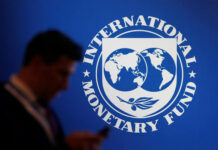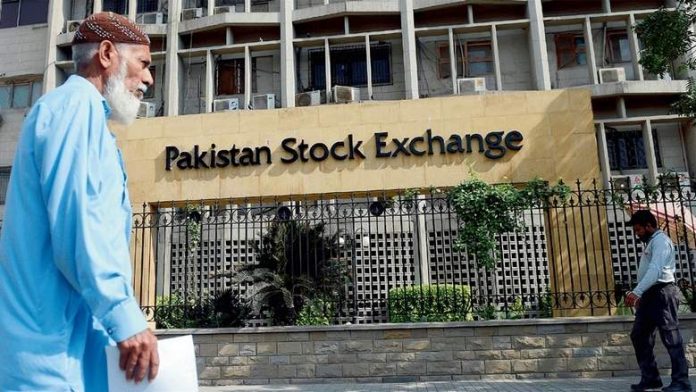KARACHI: The Pakistan Stock Exchange (PSX) has finally launched its new product, Exchange-Traded Fund (ETF), according to a statement issued by the central bank on Tuesday.
Two asset management companies (AMCs) in Pakistan, National Investment Trust Fund (NIT) and UBL Funds, will be offering the ETFs. UBL Funds will offer the UBL Pakistan Enterprise ETF, and NIT will offer the NIT Pakistan Gateway ETF.
In addition to the two authorized companies, JS Global will be the authorized market maker, or the financial institution that helps create a market for investors to buy or sell securities, and provides liquidity to the product.
The launch of the new product was coordinated online, with the PSX saying the decision was taken to ensure the safety of investors and market participants in the current climate of COVID-19 pandemic.
Aamir Khan, the Securities and Exchange Commission of Pakistan (SECP) chairman, said, “The introduction of ETFs is a big leap for the asset management industry and stock market in Pakistan as this product offers significant growth potential due to its transparent nature, low costs and embedded ability to track the index by following a passive investment strategy.”
He also said that the ETF will fill the current void in the market for a low-cost exchange-traded product.
PSX Managing Director Farrukh Khan said, “Globally, ETFs are an integral part of product offerings in the capital markets. It is a product with significant presence in over 47 countries. Looking at the growth trends of ETFs globally, I am confident that there is great potential for ETFs in the Pakistan market as they are an ideal, cost effective instrument for investors who wish to take advantage of the attractive valuations in the Pakistan market.”
Both the CEO of UBL funds Yasir Siddiqui, and the managing director of NIT Adnan Afridi were also present.
Siddiqui said that his company’s UBL Pakistan Enterprise ETF may be a suitable product for investors who wish to enter the market without having to worry about stock picking. Afridi said that NIT was the oldest AMC in the country, and had always taken a lead in Pakistan’s capital markets.
Kamran Nasir, the CEO of JS Global, said the company will provide investors with an opportunity to invest in ETFs with ease, and without human intervention in a totally automated environment.
“We are now entering a new phase of derivatives products and services of which I am proud that JSGCL has been an integral part of,” he said.
HISTORY OF ETF IN PAKISTAN
In the first week of January, the PSX said it will begin to offer ETF for the very first time in 2020. At the time, PSX had said the ETFs would be available anywhere between two weeks to one-and-half-month time. However, the SECP had not confirmed date, and that tentative launch date was later revised to the first week of March.
In mid-February, the PSX announced 14 market participants for the ETFs, including Bank Alfalah, Bank Al-Habib, Engro Fertilizers, Engro Corporation, Fauji Fertilizers, Habib Bank, Hub Power, Lucky Cement, MCB Bank, Oil & Gas Development Company, Pakistan Oilfields, Pakistan Petroleum Limited, Pakistan State Oil, and United Bank Limited. The 14 companies and banks will become part of the ETF basket, according to the notification.
The PSX had earlier set out the rules of the ETF basket in a notification in December 2019. That same month, it also had been testing operational readiness for ETFs, and also been conducting mock sessions in the after-hours with around 15 brokers, to familiarize people with the new product.
Discussions for the introduction of ETFs in the country have been ongoing for the last few years. Previously, the former CEO of PSX Richard Morin had said that ETFs would be available in the second half of 2018.
Then in September 2019, the SECP approved the necessary regulatory changes required in the PSX rule book for ETFs to operate.
WHAT IS AN ETF
An ETF is an SECP-approved product offered by AMCs, which consists of a basket of securities that tracks an index. In this case, the ETFs will either be a subset of the KSE 100 index or KSE 30 index.
The ETFs are available to investors on the PSX, through stockbrokers (TREC Holders), and trade like stocks with real time pricing during trading hours on an exchange.
The investor can either trade ETFs like a stock by buying it at a low price and selling it at a high price to make a profit, or can receive dividends from the securities that comprise the ETF basket.
ETFs are similar to mutual funds, in that an ETF owns the underlying assets (stocks or bonds) and offers investors a proportionate share in a pool of stocks, bonds, and other assets. It is a fund or portfolio of securities, divided into units (shares) of equal value.
Unlike mutual funds, ETFs are ‘passive’ investment instruments, as they track a specific market index. Typically, the cost of investing in an ETF is generally lower than in a mutual fund.
As per the PSX, the AMCs – in this case, NIT and UBL Funds – are the issuers of the ETFs. The funds’ role is to decide on the index criteria for the ETF based on their own research, looking at aspects such as liquidity and performance.
This is different from the market maker – in this case, JS Global – which acts as an intermediary between the AMC and the market. The market maker is usually a designated broker firm, decided upon between the AMC and the PSX, whose role is to provide liquidity to the market. It does so by providing units for sale on the stock exchange at asking prices, and then posting bid prices it will purchase units at, for investors wishing to sell.
According to Farrukh Khan, PSX managing director, there are 8000 ETFs globally, worth $6.5 trillion at the end of 2019. That figure is expected to grow to $7.6 trillion by the end of 2020.
























